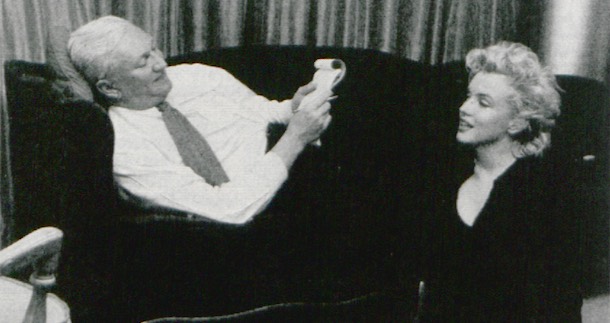This article and other features about the stars of Tinseltown can be found in the Post’s Special Collector’s Edition, The Golden Age of Hollywood. This edition can be ordered here.
I asked Flack Jones in Hollywood, “When did this business of her making those wonderful Monroe cracks start?” Jones—not his real name—is a Hollywood publicity worker who put in several years at Marilyn Monroe’s Hollywood studio before opening his own public relations office. And since it is unfair to quote a publicity worker by name, I called him Jones. And since “flack” is Hollywood slang for publicity man, I called him Flack Jones.
“You mean when somebody asked her what she wears in bed and she said, ‘Chanel Number Five’?” Jones asked. “You will find some who will tell you that her humor content seemed to pick up the moment she signed a contract with the studio, and that anybody in the department who had a smart crack lying around handy gave it to her.”
Flack Jones paused for a long moment. “I’m sorry to disagree with the majority,” he said firmly, “but she makes up those cracks herself. Certainly that ‘Chanel Number Five’ was her own.”
When I told Marilyn about this, she smiled happily. “He’s right. It was my own,” she said. “Somebody was always asking me, ‘What do you sleep in, Marilyn? Do you sleep in P.J.’s? Do you sleep in a nightie? Do you sleep raw, Marilyn?’
It’s one of those questions that make you wonder how to answer them. Then I remembered that the truth is the easiest way out, so I said, ‘I sleep in Chanel Number Five,’ because I do. Or you take the columnist Earl Wilson, when he asked me if I have a bedroom voice. I said, ‘I don’t talk in the bedroom, Earl.’ Then, thinking back over that remark, I thought maybe I ought to say something else to clarify it, so I added, ‘because I live alone.’”
“Give her a minute to think and Marilyn is the greatest little old adlib artist you ever saw,” Flack Jones insisted. “This girl makes her own quotables. She’ll duck a guy who wants to interview her as long as she can, but when she finally gets around to it, she concentrates on giving him what he wants—something intriguing, amusing and offbeat. She’s very bright at it.”
With that in mind, when I sat down to talk to Marilyn, I asked about another well-known story:
“What happened in 1952, when the studio sent you to Atlantic City to be grand marshal of the annual beauty pageant? Did you mind going?”
She smiled. “It was all right with me,” she said. “At the time I wanted to come to New York anyhow. There was somebody I wanted to see here. This was why it was hard for me to be on time leaving New York for Atlantic City for that date. I missed the train, and the studio chartered a plane for me, but it didn’t set the studio back as much as they let on. They could afford it.”
How a story gets started
Flack Jones had told me that story too. “They’d arranged a big reception for Marilyn at Atlantic City,” he said. “There was a band to meet her at the train, and the mayor was to be on hand. Marilyn and the flacks who were running interference for her were to arrive on a Pennsylvania Railroad train at a certain hour, but Marilyn was late, and when they got to the Pennsylvania Station, the train had pulled out. So there they were, in New York, with a band and the mayor waiting in Atlantic City. Charlie Einfeld, a Fox vice president—and Charlie can operate mighty fast when he has to—got on the phone and chartered an airliner. The only one available for charter was a 46-seat job—it was an Eastern Air Lines plane as I recall it—and they all went screaming across town in a limousine headed for Idlewild.”
Despite the harried last-minute readjustments, Flack Jones said that Marilyn and her outriders were only three minutes late for the reception for Marilyn on the boardwalk. There she was given an enormous bouquet of flowers, and she perched on the foldeddown top of a convertible, to roll down the boardwalk with a press of people following her car.
But, Flack Jones explained, the rest of the event wasn’t to be drama-free, either. “There was one publicity thing that broke which wasn’t intended to break. It was typical of the way things happen to Marilyn without anybody devising them,” he said. It started innocently enough:
“When when each potential Miss America from a different part of the country lined up to register, a photograph of Marilyn greeting her was taken. Pretty soon in came an Army public-information officer who brought with him four young ladies from the Pentagon. There was a WAF and a WAC and a lady Marine and a WAVE. The thought was that it would be nice to get a shot of Marilyn with ‘the four real Miss Americas’ who were serving their country, so they were all lined up. It was to be just another of the routine, catalogue shots we’d taken all day long, but Marilyn was wearing a low-cut dress that showed quite a bit of cleavage—quite a bit of cleavage. That would have been all right, since the dress was designed for eye level, but one of the photographers climbed up on a chair to shoot the picture.” Jones said that when the shot of the four service women posing with Marilyn went out across the country by wire, editors took one look at it and dropped it into the nearest wastebasket because they had much better art from Atlantic City
“But then, that night the Army PIO officer drifted back to the improvised press headquarters set up for the Miss America contest,” Flack Jones said. “He took one look and sent out a wire ordering that the picture be stopped.”
According to Jones, every editor who had junked that picture immediately reached down into his wastebasket, drew it out and gave it a big play. “In Los Angeles it ran seven columns,” he said, “and it got a featured position in the HERALD EXPRESS and the NEW YORK DAILY NEWS. All the way across country it became a celebrated picture, and all because the Army had killed it.”
He was silent for a moment; then he said, “Those who were with her told me afterward that it had been a murderous day, as any day is when you’re with Marilyn on a junket,” he went on. “The demands on her and on those with her are simply unbelievable. But finally she hit the sack about midnight because she had to get up the next day for other activities. The rest of her crowd had turned in too, when they got a call from the U.P. in New York, asking them for a statement from Marilyn about ‘that picture.’
“‘What picture?’ our publicist-guardian asked, and it was then that they got the story. They hated to do it, but they rousted Marilyn out of bed. She thought it over for a while; then issued a statement apologizing for any possible reflection on the service girls, making it plain that she hadn’t meant it that way. She ended with a genuine Monroeism: ‘I wasn’t aware of any objectionable décolletage on my part. I’d noticed people looking at me all day, but I thought they were looking at my grand marshal’s badge.’ This was widely quoted, and it had the effect of giving the whole thing a lighter touch. The point is this: A lot of things happen when Marilyn is around.” He shook his head. “Yes, sir,” he said. “A lot of things.”
Become a Saturday Evening Post member and enjoy unlimited access. Subscribe now




Comments
Very interesting interview with the one and only Marilyn. Her white light continues to pour down from the heavens, and always will for she was as beautiful on the inside as the outside. A radiance that didn’t stop with her death over 5 decades ago.
Marilyn was an excellent actress; drama or comedy, a singer, dancer and much more. If she were to come back down here, even briefly, she’d be astonished, touched and humbled at her continued popularity. She possesses an almost supernatural allure no one else has, and that’s not likely to change.